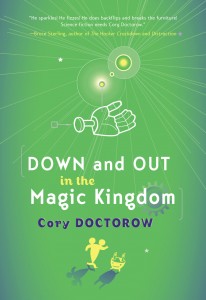 Cory Doctorow’s the pioneer of giving your work away for free and he’s had major success. He writes:
Cory Doctorow’s the pioneer of giving your work away for free and he’s had major success. He writes:
I’ve been giving away my books ever since my first novel came out, and boy has it ever made me a bunch of money.
When my first novel, Down and Out in the Magic Kingdom, was published by Tor Books in January 2003, I also put the entire electronic text of the novel on the Internet under a Creative Commons License that encouraged my readers to copy it far and wide. Within a day, there were 30,000 downloads from my site (and those downloaders were in turn free to make more copies). Three years and six printings later, more than 700,000 copies of the book have been downloaded from my site. The book’s been translated into more languages than I can keep track of, key concepts from it have been adopted for software projects and there are two competing fan audio adaptations online.
In the next paragraph there’s this interesting line (emphasis added):
Most people who download the book don’t end up buying it, but they wouldn’t have bought it in any event, so I haven’t lost any sales, I’ve just won an audience. A tiny minority of downloaders treat the free e-book as a substitute for the printed book–those are the lost sales.
Down and Out in the Magic Kingdom, Doctorow’s first novel and first foray into this experiment, came out in 2003. The success he’s had since then is mostly irrelevant because he’s now one of the world’s most recognizable science fiction writers, but in 2003 the world was a much different place. It was a time before Kindle, Scribd, and the ebook revolution. In other words, if you’re releasing an ebook today, a much larger share of ebooks you give away are going to fall into the latter category – a “substitute for the printed book.”
When Down and Out came out it was more than likely that people downloaded the free book to check out on their desktop to get a taste and then were inspired to purchase a printed copy. But we’re living in a time when more and more people are e-only, and these numbers are only going to grow, so does this system make sense anymore?
I’d say yes.
Even though people aren’t necessarily going to be buying a copy of your book after reading the free version, it still spreads the word in a better way than if you charged for it. Personally, I’ve had decent success at Scribd – 280 people have downloaded my book. If I charged, say, $3.00 for it, maybe I’d have a third of the downloads, if that. Yes, I’d be putting a few extra dollars in my pocket, but at the expense of having fewer readers. At this stage in my career, I’d rather have the readers than have the money. Much more can happen with the book if the word gets spread around than if I have $75 in my pocket.
“Don’t Publish Me” has a good post on this subject called Royalties Schmoyalties. She writes,
Our writing is valuable, of course it is. But we can’t assume that we can place a tangible value on it just because we slaved over it and we think it’s great. People just won’t pay for it until they know who the hell you are and THEY place the value on it.
On Smashwords, you can see writers charging an exorbitant amount for an ebook from an unknown writer. High prices on a print on demand book make some sense because sometimes you don’t have a choice – that’s how much printing costs. But an ebook is a different matter and you have to ask yourself, would you rather have readers or $50 in your pocket? Obviously economic times are tight and $50 is useful, but not that useful.
The value of Smashwords or the Kindle is you can re-price your book whenever you want. So if suddenly there is high demand because your name’s getting out there, then you can possibly think about raising the price. That’s basically how capitalism works – lower the price to generate interest. When there’s interest, raise it. An unknown writer should take the approach. Especially during an age when, unfortunately, it’s difficult to give things away.
You could make an argument that readers won’t trust a free book the way they’d trust a book with a price tag – as if price means value. Additionally, if people shell out money for a book, they’ll be more willing to read it, rather than have it languish on a harddrive or ereader. That’s a chance you’ll have to take. Just ask yourself, why do you write? To be read or to profit? When you boil it down, you have a better chance at the latter if you start with the former.
Get an Editorial Review | Get Amazon Sales & Reviews | Get Edited | Publish Your Book | Enter the SPR Book Awards | Other Marketing Services






















One reason I don’t have a problem giving my writing away for free is because when I was publishing short stories in online lit journals, people were reading my writing for free, anyway. The point is to be read.
This article raises some really interesting points–people often get so entrenched in the idea of selling books and making quick $$. It can be really hard work and that is why I always ask my clients what is their ‘overall objective’ for creating a book–is it t increase brand awareness, is to get more speaking gigs and run workshops? The book should form just one part of your overall strategy.
I can give two examples of how this has worked really well for a couple of my clients.
1) To produce a book as a lead generator for attracting potential clients, Messenger collaborated with an author to produce a high-quality yet relatively inexpensive book for use as both a professional, information-packed ‘business card’ and a giveaway for potential clients.
For this project, our marketing and distribution strategy was to target events such as charity dinners and offer all attendees the book as a gift either on their seat or in their ‘goodie bag’. By the end of the night, up to 1000 ‘high net worth’ individuals had received the book.
The strategy was extremely effective because the recipients perceived the book to be of high value and the client to be generous in giving it away; however, once it had had multiple print runs, the ‘per unit’ cost was very minimal because the author was paying for the print component only and could financially justify the giveaway. The distribution strategy was so successful that more than 90 per cent of new enquiries to the author’s business were from people who’d encountered the book.
Having marketed himself in this way, the author went on to host two TV shows, secure many media interviews, elevate his profile and position himself as the expert in his field. Messenger believes that a book can be a platform from which to leverage many other opportunities: the sky’s the limit!
2) We also produced a book for a recruitment agency to use as a door opener so they could build relationships and rapport with their dream clients, Messenger worked with them to improve their chances of acquiring new business during the current financial downturn in light of companies’ unwillingness to meet with new recruitment agencies at this time.
We developed a fresh re-positioning strategy so the agency could gain access to their dream clients without facing instant rejection. We changed the angle of approach so that rather than cold call their blue-chip potential clients, the agency became an author who wanted to interview the companies’ HR director in order to undertake a case study of the organisation’s HR practices. Because the companies had a mindset of ‘high profile’, they liked the attention, and within a fortnight the author had set up a meeting with every one of the HR directors.
By the time the author had completed the interview process, she’d built rapport and opened the door to many new opportunities as the companies’ recruitment agency of choice. Once the organisations had taken delivery of the books, they even purchased extra copies to give away to their staff.
I agree with you to an extent. (Isn’t that always the way with me?) I definitely feel that there should be SOME free giveaways. For me personally I’m doing KEPT as a free giveaway to get people plugged into the series, as well as free excerpts otherwise (If people were just wanting a taste, three chapters of anything should be sufficient), and a free podcasted reading of the work.
But I certainly will not be giving away the full ebook of everything I write merely because hey… I have to monetize THAT stream. Ebooks are something people can sell, it makes no sense in a world rapidly moving toward a future where E will be the primary delivery system, to train your customers (readers) to expect it all for free. Doing that makes it nearly impossible to turn them into paying customers for the same thing later.
That’s my story, and I’m sticking to it!